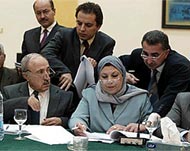IGC agrees interim constitution
Members of the US-appointed Iraqi Governing Council have agreed to an interim constitution.

Washington hailed Monday’s agreement, which came after a two-day delay because of splits over the role of Islam, quotas for women in government and Kurdish demands for autonomy.
US Secretary of State Colin Powell said he expected US administrator for Iraq Paul Bremer, who wields veto power over decisions taken by the 25-member council, to approve the interim constitution.
“I haven’t read all of the language that was agreed to over the weekend but I am fairly confident that Ambassador Bremer will be able to approve it,” he said on the CBS Early Show.
The document will be officially signed on Wednesday and take effect on 1 July. It will last until a permanent charter is drawn up by a new parliament to be directly elected by the people before the end of January 2005.
British Prime Minister Tony Blair, a staunch supporter of the war against Iraq, also welcomed the deal as a “significant foundation stone”.
Islam’s role
Officials and participants in the talks said the law recognised Islam as Iraq’s official religion and said it would be a source of legislation, but not the primary source, as had been demanded by the majority of Iraq’s Shia population, which make up 53% of the country.
 |
|
Members of the council ensured |
A senior occupation official said the constitution “strikes the right balance” between the Islamic identity of most Iraqis and the need to enshrine freedom of religion and freedom of speech, which are protected by a bill of rights in the document.
“The language on Islam and the state effectively says that this won’t compromise individual rights or democratic principles,” said the official.
The document says elections should be held by late 2004 or early 2005. Washington’s initial plan was for elections by the end of 2005, but Iraq’s most influential Shia cleric, Ayat Allah Ali al-Sistani, demanded polls should be held sooner.
Al-Sistani initially said the provisional government due to take power on 30 June should be directly elected, but after a UN team ruled this was not feasible, he softened his stance and said elections had to be be held by the end of 2004.
Details
Hamid al-Bayati of the Supreme Council for the Islamic Revolution in Iraq (SCIRI), one of the main Shia political groups, said the document ensured “there can’t be any law passed that is not in keeping with Islam”, and that it met al-Sistani’s demands.
 |
|
Many of Iraq’s Shia wanted |
“This is what Ayat Allah Sistani wanted to see in the interim constitution, so yes, what has been agreed is OK, although not everyone is fully and completely happy with what was in there,” he said. “This is a process in which people had to back off some of the things they wanted.”
Another controversial issue had been whether there should be guarantees about the representation of women. The senior occupation official said the document ensured 25% of seats for women in a forthcoming legislative assembly.
The interim constitution’s backing for a federal state also recognises the northern zone Kurds have run since wresting it from Baghdad’s hands after the 1991 Gulf war, one element of an attempt for autonomy that some Arabs fear will split Iraq.
Kurd demands met
Rowsch Shways, who represented Kurdish Council member Massud al-Barzani in the talks, said the language on federalism met Kurds’ demands that their Peshmerga or militias remain as a Kurdistan national guard rather than as part of a national army.
The document leaves the status of areas which Kurds argue belong to the Kurdish north until a permanent constitution is set.
Al-Bayati said Kurdish council member Jalal Talabani had negotiated a compromise on that issue that included an apology to those who walked out and an agreement to postpone cancelling the council’s earlier decree.